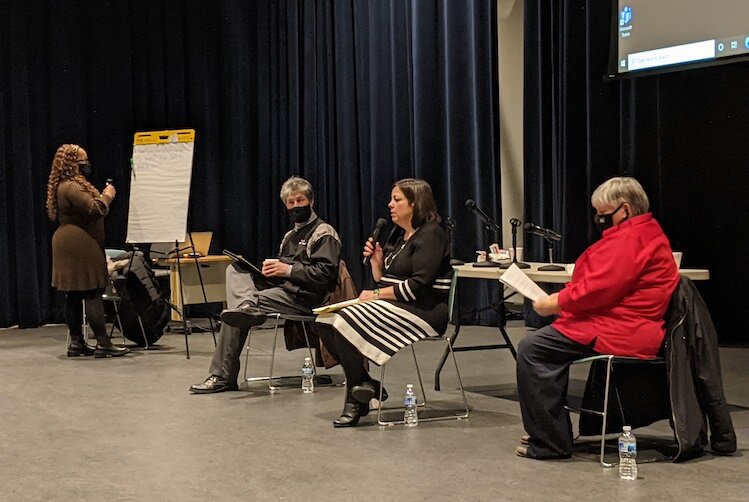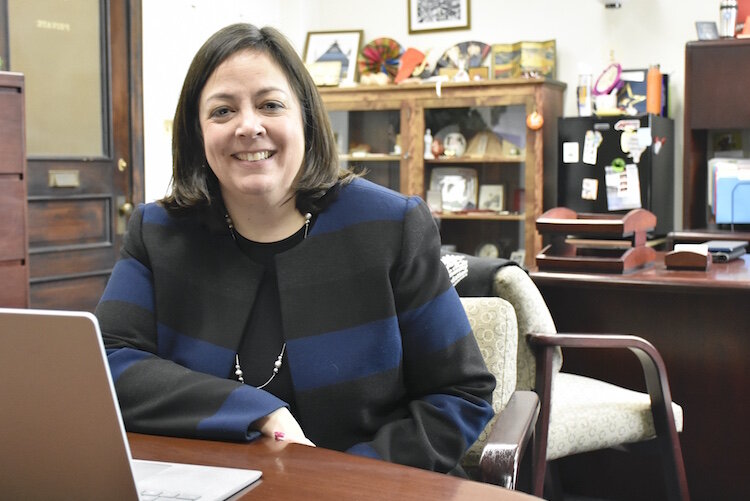Battle Creek City Manager Rebecca Fleury says city will keep working to keep community safe in 2022
There's other work to do beyond the pandemic responsibilities and it will be tackled in Battle Creek. City Manager Rebecca Fleury says, “From an economic development perspective, we are continuing to focus on small business and woman and minority-owned businesses, not only in the downtown district but also feeder districts and Beckley Road.”
Editor’s note: This story is part of Southwest Michigan Second Wave’s On the Ground Battle Creek series.
Rebecca Fleury says she, like everybody else, was hoping that 2022 would be the year that COVID went away.
Fleury, City Manager of Battle Creek since 2014, says as 2021 turned into 2022 she knew the virus wasn’t going anywhere when variants began surfacing and spreading throughout Calhoun County.
Much as she’d prefer to focus exclusively on advancing projects and initiatives identified as priorities by residents and city leaders, she says she knows she will have to continue to juggle this work with attention to the virus, its variants, and the ongoing safety of the city’s more than 51,000 residents and the city’s 559 employees, that’s 491 full-time and 68 part-time, seasona, or temporary employees.
Managing the city as virus spreads will involve the continued activation of the Joint Operations Center (JOC), made up of community leaders representing different sectors, including nonprofits, law enforcement, and government, and the Joint Information Center (JIC), an organization which provides ongoing communications about the status of the pandemic locally.
“Keeping the JOC and JIC active and continuing to message was a focus last year and will be a focus in 2022,” Fleury says.
The crash course she received at the start of the pandemic in 2020 in managing the city in the midst of an ongoing pandemic has positioned her well to lead against the backdrop of an ever-changing sense of normal.
“Managing COVID and understanding ARPA (American Rescue Plan Act) funding will be the major challenges this year,” Fleury says. “Figuring out how the ARPA money can be spent and what the criteria are, identifying the city’s needs and gaps COVID left in the budget will be at the forefront of what we’ll be working on. We also will be looking at how we balance city government needs as well as community needs.”
The city’s general fund operating budget is more than $50 million. The city’s allocation of ARPA funds is $30.5 million, which must be assigned by the end of 2024, and spent by the end of 2026.
Having these one-time funding allocations is “wonderful, but we have to be able to sustain our overall budget going forward,” Fleury says.

Based on input from residents gathered during meetings in the last few months, city staff recommended ARPA-funded projects to city commissioners who have already approved projects including the restoration of the McCamly Plaza Hotel; a re-purposing of the Dolliver property for additional affordable housing options; and a communal kitchen concept at area hotels and motels to meet the needs of individuals using hotels and motels for long-term housing options.
Other projects under review include The Village initiative.
“We will be working on enhancing residential development. Housing is in a pinch everywhere and we have to find ways to meet the demand from permanent supportive housing all the way up to market rate,” Fleury says. “It’s an issue of accessibility and expanding opportunities to a variety of housing types. We have the capacity in all of those areas and will be working with Neighborhoods Inc. and other housing partners to advance this work.”
The city also will be collaborating on a countywide transit authority and a countywide broadband initiative.
“There is support to advance with the transportation authority and the plan is to go for a countywide millage vote in 2023. This year, there will be meetings with the cities of Albion, Springfield and Marshall as well as townships and villages to see where we all are on that,” Fleury says. “The transportation authority is the next best step for Calhoun and the city. An option could be that the city would contract with the authority to run and operate services. We’re certainly open and willing because we know that transportation is a barrier for so many. We will be talking with residents about what they’ll get for the millage we’ll be asking them to approve.”
Going into 2022, city commissioners will be reviewing 28 community projects that are recommended for ARPA funding. Fleury says some of these projects may be eligible to receive ARPA funds allocated to the state of Michigan.
This could further ease the financial burden on the city to cover the cost of increases in materials needed such thing as a street repair program or construction projects. Currently, the city is looking at all capital improvements to determine what projects can be funded with the resources available.
Higher costs for material also are impacting development efforts in the city’s downtown, which Fleury describes as an “older urban core.”
In spite of the pandemic and funding gaps, Fleury says in the past year there was forward momentum including the completion of the iconic Milton building and a first-ever public installation of origami artwork in the downtown district. These initiatives were opportunities to celebrate community successes, she says.
“From an economic development perspective, we are continuing to focus on small business and woman and minority-owned businesses, not only in the downtown district but also feeder districts and Beckley Road,” Fleury says. “The model for the Lakeview Square Mall isn’t viable anymore and with Horrock’s opening there this year it will give us opportunities to re-think development along Beckley Road. I hope to see a lot more construction projects get back on track.”
Less visible, as important
With the lifting of eviction moratoriums and the termination of employment assistance and stimulus checks, Fleury says city leaders are closely monitoring the economic impact of COVID on the most vulnerable residents. She says ARPA funds will be leveraged to support the basic needs of these individuals.
Another outgrowth of the pandemic is trauma that is on the increase among all age groups. Although its impacts are not always visible, Fleury says it’s readily apparent with school students and educators who have been running a relentless gauntlet of in-person and virtual learning since the pandemic began. The effects of this disruption has been compounded by shortages in bus drivers and school staff which has led to a reduction in services.
“Is this a temporary side effect of COVID or are these things here to stay?” Fleury asks.
Faced with the same staffing shortage issues that other businesses and organizations are facing, including Calhoun County government, Fleury says talent recruitment and retention is another area that she considers a challenge this year and in subsequent years.
“In municipal government we’re seeing more retirements or people leaving public service, especially in police, fire and public transit,” she says.
The city will be hiring a consultant to look at the current service delivery models of police, fire and EMS (Emergency Medical Services).
“We’re down 12 positions in the police department and everyone is vying for these same people and we can’t fill these positions,” Fleury says. “There are not as many people going into police work, which begs the question, ‘Are we still using the right model?’ It’s the same for the traditional fire service delivery model and ambulance service because we don’t have enough people to staff them and their calls for service vary. Police, fire and EMS are all feeling huge pressure points right now.”
An attractive benefits package and a defined benefit pension plan used to be effective and successful recruiting tools for the city, but they are not having the same impact which is highlighted by growing numbers of people quitting their jobs in search of careers that will offer greater flexibility. Economists refer to this as “The Great Resignation” and city leaders are paying attention.
“We are thinking creatively and innovatively to attract workers to create a diverse workforce that is reflective of the community we serve,” Fleury says, adding that city employees have been doing a tremendous job. “Faced with working during a pandemic and ever-changing circumstances, they’re doing amazingly well. They show up and do their jobs.”
This is among the few constants in 2022 among a number of uncertainties.
The message Fleury has for city residents: “I want them to have confidence that the city is doing everything we can to support our community and the negative impact of the pandemic while still being a full-service city. We continue to work together as a community to be available and provide services and support where we can.”
















